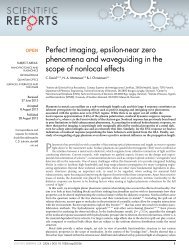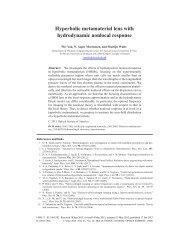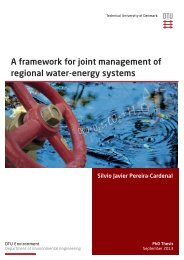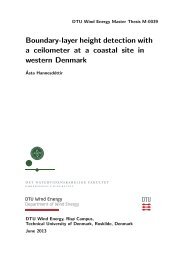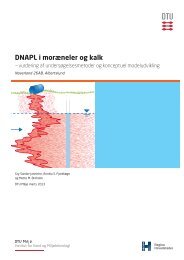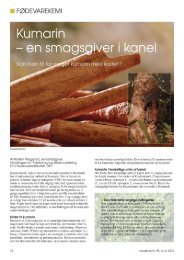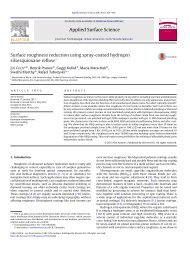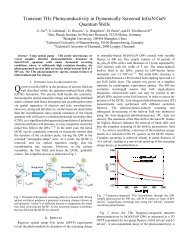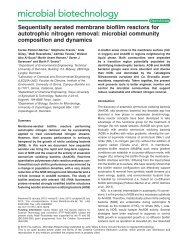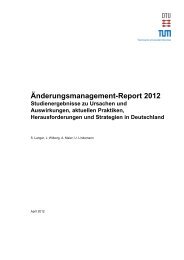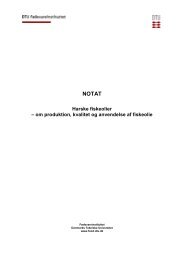PEC12-25 CAPEC-PROCESS Industrial Consortium ... - DTU Orbit
PEC12-25 CAPEC-PROCESS Industrial Consortium ... - DTU Orbit
PEC12-25 CAPEC-PROCESS Industrial Consortium ... - DTU Orbit
Create successful ePaper yourself
Turn your PDF publications into a flip-book with our unique Google optimized e-Paper software.
3.3 Post-Doctoral Research Project Overview<br />
Miguel Mauricio Iglesias<br />
(MMI)<br />
<strong>CAPEC</strong><br />
Supervisors: GSI<br />
Start: 01-01-2012; End: 30-09-2012<br />
Mathias Nordblad (MAN)<br />
<strong>PROCESS</strong><br />
Supervisors: JW<br />
Start: 01-12-2008; End: 31-11-2012<br />
Model-based scale-up of bioprocesses<br />
Scale-up is an important step in the development and<br />
commercialization of new process technologies in many<br />
industries, for production of chemicals such enzymes,<br />
antibiotics or materials such as bioplastics. Moving a<br />
fermentation process from a lab-scale to a commercial/<br />
production scale remains still challenging due to a number of<br />
factors that affects biological response of cells to changing<br />
conditions from cultivation. Scale-up problems may arise<br />
then due to inadequate interphase mass transfer, heat removal<br />
and non-uniform temperature and concentration gradients in<br />
the reactor. As a result, many large-scale fermentation<br />
processes give a lower yield than achieved in the laboratory.<br />
This project conducted as part of DSF funded EcoDesign<br />
aims at developing a framework for scale-up of bioreactors<br />
based on data and information translated into quantitative<br />
knowledge using models. The framework allows using<br />
multiobjective scale-up principles and various degree of<br />
models, from first-principles to empirical (e.g. response<br />
surface type models based on experimental data) to hybrid<br />
models.<br />
Research area: B, D<br />
Process design and evaluation for enzymatic biodiesel<br />
production<br />
Biodiesel is one of the more established renewable fuel<br />
alternatives. It is traditionally produced using alkaline<br />
catalysis, which comes with certain limitations.<br />
The use of enzymatic catalysis promises several advantages<br />
over traditional production method, including higher yields,<br />
compatibility with a wider range of oil feedstocks and a safer<br />
process. Additionally, the mild reaction conditions also<br />
reduce the need for product purification and increase the<br />
value of the by-product glycerol. However, the process<br />
requires development and optimization to meet criteria for<br />
performance and operating costs.<br />
The focus of this project is the reaction and process design<br />
for enzymatic biodiesel production, based on evaluation of<br />
the performance of individual unit operations and overall<br />
process economics. The project is part of, and supported by, a<br />
larger collaboration looking into catalyst and reactor<br />
performance in enzyme-catalyzed biodiesel reactions, as well<br />
as system thermodynamics and sustainability issues.<br />
Collaborators: Emmelev; Novozymes; Aarhus University;<br />
<strong>DTU</strong> Management




